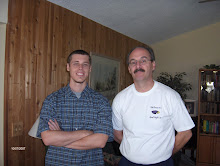 I just finished reading Cormac McCarthy's, The Road. I was moved, terrified, and humbled by this powerful masterpiece. But more importantly, I was given an insight into the heart of man.
I just finished reading Cormac McCarthy's, The Road. I was moved, terrified, and humbled by this powerful masterpiece. But more importantly, I was given an insight into the heart of man.The images you see are pre-released from the movie based on the book. They do well to capture the grizzly landscape of an America, post nuclear fallout, where hope and "the good guys" are dying.
The story is told from a father and son bound to each other by love. In this bleak new America, they travel south towards Mexico, running from the great freezing nuclear winter, seeking warmth, and food. Nothing grows any longer. All animals are dead. Only a scattered few humans roam the towns and the roadways, on a continual search for food scraps that have survived in abandoned houses. But these are almost gone
The human heart laid bare:
Who are we, really? The question of man's integrity and goodness has been posited this way: "The real us is who we are when nobody is looking."

However, having read The Road, a revelation struck me. The above phrase doesn't go far enough in all cases. The phrase only works in a civilized setting.
But strip civilization away, and one comes to a new, deeper, darker truth about man: "The real us is who we are when we've been stripped of food, shelter, safety; forced to compete with a struggling few survivors for the scraps of food sources that are increasingly being exhausted; and then we wake up to find that some men are eating each other to survive, and we ask ourselves, who am I truly...who am I willing to become to live another day?"
How would we--as individuals--fare in such a setting. Much of our goodness and goodwill comes from the fact that we ARE satisfied. That we HAVE comforts. We can lose our house, our job; people close to us may pass away, but we still have civilization to fall back upon. How much of our apparent goodness comes from the fact we have every real need met. TV, toilets, showers, those aren't true needs. Food and water for our stomachs, clothing to keep us alive in the cold, Shelter to keep out the rain and the snow and a freeze that reaches deeper than layers of clothing. These are true needs.
 "Who are we really?" Ultimately, that comes down to this: "What do I believe about existence?" "What do I believe is the purpose of life?"
"Who are we really?" Ultimately, that comes down to this: "What do I believe about existence?" "What do I believe is the purpose of life?" In such a desolate scenario as posited in The Road, the answer to those questions determines who you will become.
Will you live for yourself, and keep yourself alive at any cost? Or will you cling to decency and goodness, even if it means you starve to death.
That begs the question...does decency and goodness exist? Civilization is set up in such a way that they do. But when civilization is torn apart, do we still go on holding to its principles?
Only a belief in something greater than oneself could lead one to give up his or her life. But what makes us think such things?
Is good subjective? Is it really something that exists beyond the human imagination.

In The Road, the father struggles with this. He is willing to resort to nearly any means to keep his son alive. This is love, and it defies nature. Nature does not love in the sense that man can love. The father lives for his son, but ultimately, his love for his son, and his will to keep him alive can lead him to do heinous things.
Throughout the novel however, the boy holds his father to goodness. To a higher law. And it is the sons radical adherence to this law that keeps in check his father's relentless, often brutal, devotion.
This powerful work of art does what all good art does. It makes one think. Evaluate. What if one day one's own heart was laid bare? The mask of civilization gone. No self-deception. Only his raw self staring transparent before himself.
We can look even now. Who would we become if such a devastating scenario should take place? The answer to that question is this...
Who we would become; that is a part of who we are now.
And who we are now, and who we can become are wrapped up in the question of existence. Why do I exist? Do I have a purpose?
Your thoughts...







No comments:
Post a Comment